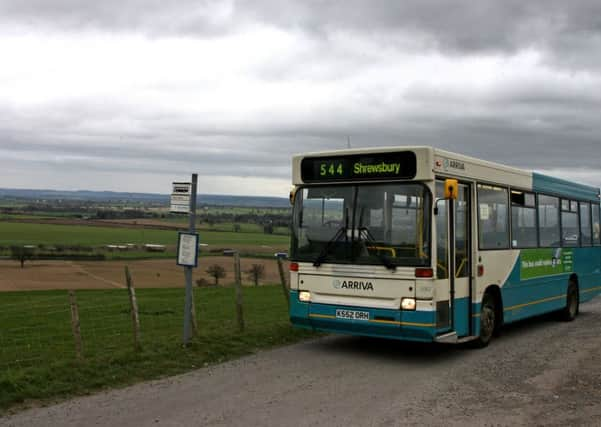Bus funding cuts '˜turns Yorkshire into transport deserts'


Nearly £30m has been slashed from local authority-supported bus funding in the last financial year, analysis by the Campaign for Better Transport (CBT) has found, with nearly £3m in Yorkshire alone.
This funding, subsidising buses often serving the most rural areas or extending timetables into evenings and weekends, is essential in supporting communities they say.
Advertisement
Hide AdAdvertisement
Hide Ad“Buses across Yorkshire have been hit hard by funding cuts,” said Lianna Etkind, public transport campaigner for CBT.
“These cuts come on top of cuts to school transport and the underfunding of free pensioner travel; together these threaten the viability of whole bus networks and will lead to ‘transport deserts’ in some rural and suburban areas where there is no public transport at all.”
The budget is used to subsidise buses not provided by commercial operators, serving communities where no alternative exists.
In Yorkshire, the total budget for supported bus services has been slashed by £2.7m from £32.6m to £29.8m, a figure of nine per cent in the past financial year.
Advertisement
Hide AdAdvertisement
Hide AdThe biggest cuts were in North Yorkshire County Council (NYCC) budgets, with a 51 per cent fall in funding of £1.4m, while York Council has seen an 18 per cent cut.
Martin Tett, transport spokesman at the Local Government Association (LGA), representing more than 370 councils in England and Wales, said local authorities “know how important buses are for their communities and local economies”.
He insisted councils are “desperate to protect them” despite suffering huge funding cuts.
The CBT and the LGA want local authorities to be given more freedom to improve networks through the Bus Services Bill, which is going through Parliament.
Advertisement
Hide AdAdvertisement
Hide AdMs Etkind said local authorities need to have “the full range of powers at their disposal”.
“This decline is not inevitable,” she said. “There is hope that powers in the bill will help local authorities to better plan and set standards for their bus networks, improving people’s access to jobs, services and education.
“The Government needs to understand the vital role buses play in the economy, the environment and to wider society and to commit to protecting bus services, not just in towns and cities but in rural areas as well.”
The Government has suffered a series of defeats in the Lords over the legislation, including on its bid to prevent councils forming companies to provide bus services. Transport Secretary Chris Grayling has said the Bill does not seek to allow councils to retake control of the bus market.
Advertisement
Hide AdAdvertisement
Hide AdInstead, he wants private companies to “dominate” it via “improved partnerships or franchising” - in which services are specified and operators can bid for them.
Across Yorkshire, the CBT found, every single local authority area has seen cuts to its budgets for supported bus services.
In West Yorkshire, funding has fallen £633,000, three per cent of its total budget. But in North Yorkshire, it’s fallen £1.4m, more than half of the sum set aside to subsidise services. In York, the funding cut year on year is £150,000, a sum totalling 18 per cent of its budget, with the withdrawal of three supported routes and cuts to services in seven more.
“We’ve got real congestion and pollution issues in York,” said Rachael Maskell, MP for York Central. “If we are to address these problems then we really need to have effective services.
Advertisement
Hide AdAdvertisement
Hide Ad“We already know there’s narrowing of services on a Sunday and into the evening. That results in people using private transport which adds to the problems.
“We’ve got issues with buses that desperately need converting to challenge air pollution in York. We need to encourage as many people as possible to use public transport in order to improve the air quality. Looking at strategic transport plans is important.
“We want to encourage more public transport, it’s there for everybody and it increases mobility. Every time bus services are cut back it does have a real impact on the wider community.”
The ‘Buses in Crisis’ research by CBT shows that across the country, there has been an 11 per cent reduction in local authority supported bus funding in the last financial year. The research also found that since 2010 over £100m, 33 per cent, has been cut from local authority bus funding and 2,900 bus services have suffered cut backs and withdrawals resulting in what it says are huge disruptions for communities.
Advertisement
Hide AdAdvertisement
Hide AdA Department of Transport spokesman said: “Buses are vital for local communities, connecting people, homes and businesses, and we are giving councils extra powers to work in partnership with bus companies to improve the service passengers expect and deserve. While decisions on funding for services are a matter for local authorities, we provide around £250 million to support bus services every year, benefiting people up and down the country.”